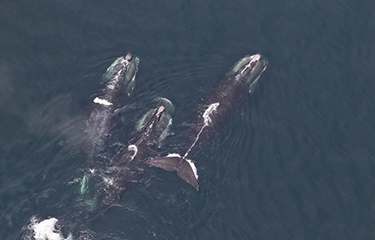An unusual winter concentration of endangered North Atlantic right whales in Cape Cod Bay prompted officials from the U.S. state of Massachusetts and the U.S. National Marine Fisheries Service to order a three-month removal of trap and pot fishing gear in the region through 30 April.
The emergency rule announced 31 January covers the Massachusetts Restricted Area Wedge, where the gear closure is intended to reduce the risk of gear entanglement “when large numbers of whales are exiting Cape Cod Bay at the same time and place where fishermen are either fishing or may be staging their trap- [or] pot-fishing gear in preparation for the 1 May opening of federal waters in the Massachusetts Restricted Area,” NMFS said in a press release.
NMFS last imposed a similar emergency rule for the Massachusetts wedge area in April 2022. The Massachusetts Division of Marine Fisheries requested the NMFS action, as the state imposed its own seasonal restrictions for state waters effective 1 February.
“The purpose of these closures is to protect seasonal aggregations of right whales from potential entanglements in buoy lines,” according to state fisheries officials. “Compliance with these closures is critically important to state and federal right whale conservation strategies.”
Massachusetts officials have been tracking an unusual mid-winter “feeding aggregation” of right whales in Cape Cod Bay, and alerting mariners about the risk of vessels colliding with the surface feeding animals while recommending a sharp lookout and limiting speed to less than 10 knots.
On 18 January, the Center for Coastal Studies aerial survey team documented “at least 27 right whales in lower and eastern Cape Cod Bay, which were surface and subsurface feeding,” according to the Massachusetts Division of Marine Fisheries.
“A surface feeding aggregation of this size is typical in the spring but less commonly observed in the winter months,” it said. “Due to the early presence, behavior, and size of the aggregation, DMF is urging mariners to use extreme caution when transiting Cape Cod Bay. Zooplankton sampling indicates high concentrations at the surface that are expected to last a week or more. Although right whales will likely switch to feeding on zooplankton species closer to the seafloor, the current feeding behavior at the surface warrants vigilance from mariners.”
Reporting by Kirk Moore
Photo courtesy of NOAA







